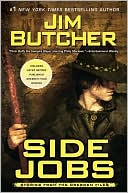In the Company of Cheerful Ladies (The No. 1 Ladies' Detective Agency Series #6)
THE NO. 1 LADIES’ DETECTIVE AGENCY - Book 6\ \ Fans around the world adore the bestselling No. 1 Ladies’ Detective Agency series, the basis of the HBO TV show, and its proprietor Precious Ramotswe, Botswana’s premier lady detective. In this charming series, Mma Ramotswe navigates her cases and her personal life with wisdom, and good humor—not to mention help from her loyal assistant, Grace Makutsi, and the occasional cup of tea.\ Precious is busier than usual at the detective...
Search in google:
Readers everywhere have been captivated by the New York Times best-selling No. 1 Ladies' Detective Agency series, from award-winning wit Alexander McCall Smith. Mma Ramotswe is very busy. She has a full caseload at the agency, there's been an intruder in her home, and her unfortunate past has returned to haunt her. Maybe it's a good thing her husband, Mr. J.L.B. Matekoni, is too distracted to notice. For it seems one of his apprentices has run off with an older woman!The New York Times Sunday Book Review - Janet MalcolmThe ''No. 1 Ladies' Detective Agency'' series is a literary confection of such gossamer deliciousness that one feels it can only be good for one. Fortunately, since texts aren't cakes, there is no end to the pleasure that may be extracted from these six books.
Chapter One Honesty, Tea, and Things in the Kitchen\ Mma Ramotswe was sitting alone in her favourite café, on the edge of the shopping centre at the Gaborone end of the Tlokweng Road. It was a Saturday, the day that she preferred above all others, a day on which one might do as much or as little as one liked, a day to have lunch with a friend at the President Hotel, or, as on that day, to sit by oneself and think about the events of the week and the state of the world. This café was a good place to be, for several reasons. Firstly, there was the view, that of a stand of eucalyptus trees with foliage of a comforting dark green which made a sound like the sea when the wind blew through the leaves. Or that, at least, was the sound which Mma Ramotswe imagined the sea to make. She had never seen the ocean, which was far away from land-locked Botswana; far away across the deserts of Namibia, across the red sands and the dry mountains. But she could imagine it when she listened to the eucalyptus trees in the wind and closed her eyes. Perhaps one day she would see it, and would stand on the shore and let the waves wash over her feet. Perhaps.\ The other advantage which this café had was the fact that the tables were out on an open verandah, and there was always something to watch. That morning, for instance, she had seen a minor dispute between a teenage girl and her boyfriend-an exchange of words which she did not catch but which was clear enough in its meaning-and she had witnessed a woman scrape the side of a neighbouring car while she tried to park. The woman had stopped, quickly inspected the damage, and had then driven off. Mma Ramotswe had watched this incredulously, and had half-risen to her feet to protest, but was too late: the woman's car had by then turned the corner and disappeared and she did not even have time to see its number-plate.\ She had sat down again and poured herself another cup of tea. It was not true that such a thing could not have happened in the old Botswana-it could-but it was undoubtedly true that this was much more likely to happen today. There were many selfish people about these days, people who seemed not to care if they scraped the cars of others or bumped into people while walking on the street. Mma Ramotswe knew that this was what happened when towns became bigger and people became strangers to one another; she knew too that this was a consequence of increasing prosperity, which, curiously enough, just seemed to bring out greed and selfishness. But even if she knew why all this happened, it did not make it any easier to bear. The rest of the world might become as rude as it wished, but this was not the way of things in Botswana and she would always defend the old Botswana way of doing things.\ Life was far better, thought Mma Ramotswe, if we knew who we were. In the days when she was a schoolgirl in Mochudi, the village in which she had been born, everybody had known exactly who you were, and they often knew exactly who your parents, and your parents' parents, had been. Today when she went back to Mochudi, people would greet her as if she had barely been away; her presence needed no explanation. And even here in Gaborone, where things had grown so much, people still knew precisely who she was. They would know that she was Precious Ramotswe, founder of the No. 1 Ladies' Detective Agency, daughter of the late Obed Ramotswe, and now the wife (after a rather protracted engagement) of that most gracious of mechanics, Mr J.L.B. Matekoni, proprietor of Tlokweng Road Speedy Motors. And some of them at least would also know that she lived in Zebra Drive, that she had a tiny white van, and that she employed one Grace Makutsi as her assistant. And so the ramifications of relationships and ties would spread further outwards, and the number of things that might be known would grow. Some might know that Mma Makutsi had a brother, Richard, who was now late; that she had achieved the previously unheard-of result of ninety-seven per cent in the final examinations of the Botswana Secretarial College; and that following upon the success of the Kalahari Typing School for Men, she had recently moved to a rather better house in Extension Two. Knowledge of this sort-everyday, human knowledge-helped to keep society together and made it difficult to scrape the car of another without feeling guilty about it and without doing something to let the owner know. Not that this appeared to make any difference to that selfish woman in the car, who had left the scrape unreported, who clearly did not care.\ But there was no point in throwing up one's hands in despair. People had always done that-the throwing up of hands, the shrug-but one got nowhere in doing so. The world might have changed for the worse in some respects, but in others it was a much better place, and it was important to remember this. Lights went off in some places, but went on in others. Look at Africa-there had been so much to shake one's head over-corruption, civil wars, and the rest-but there was also so much which was now much better. There had been slavery in the past, and all the suffering which that had brought, and there had been all the cruelties of apartheid just those few miles away over the border, but all that was now over. There had been ignorance, but now more and more people were learning to write, and were graduating from universities. Women had been held in such servitude, and now they could vote and express themselves and claim lives for themselves, even if there were still many men who did not want such things to be. These were the good things that happened and one had to remember them.\ Mma Ramotswe raised her tea cup to her lips and looked out over the brim. At the edge of the car park, immediately in front of the café, a small market had been set up, with traders' stalls and trays of colourful goods. She watched as a man attempted to persuade a customer to buy a pair of sunglasses. The woman tried on several pairs, but was not satisfied, and moved on to the next stall. There she pointed to a small piece of silver jewellery, a bangle, and the trader, a short man wearing a wide-brimmed felt hat, passed it across to her to try on. Mma Ramotswe watched as the woman held out her wrist to be admired by the trader, who nodded encouragement. But the woman seemed not to agree with his verdict, and handed the bangle back, pointing to another item at the back of the stall. And at that moment, while the trader turned round to stretch for whatever it was that she had singled out, the woman quickly slipped another bangle into the pocket of the jacket she was wearing.\ Mma Ramotswe gasped. This time, she could not sit back and allow a crime to be committed before her very eyes. If people did nothing, then no wonder that things were getting worse. So she stood up, and began to walk firmly towards the stall where the woman had now engaged the trader in earnest discussion about the merits of the merchandise which he was showing her.\ "Excuse me, Mma."\ The voice came from behind her, and Mma Ramotswe turned round to see who had addressed her. It was the waitress, a young woman whom Mma Ramotswe had not seen at the café before.\ "Yes, Mma, what is it?"\ The waitress pointed an accusing finger at her. "You cannot run away like that," she said. "I saw you. You're trying to go away without paying the bill. I saw you."\ For a moment Mma Ramotswe was unable to speak. The accusation was a terrible one, and so unwarranted. Of course she had not been trying to get away without paying the bill-she would never do such a thing; all she was doing was trying to stop a crime being committed before her eyes.\ She recovered herself sufficiently to reply. "I am not trying to go away, Mma," she said. "I am just trying to stop that person over there from stealing from that man. Then I would have come back to pay."\ The waitress smiled knowingly. "They all find some excuse," she said. "Every day there are people like you. They come and eat our food and then they run away and hide. You people are all the same."\ Mma Ramotswe looked over towards the stall. The woman had begun to walk away, presumably with the bangle still firmly in her pocket. It would now be too late to do anything about it, and all because of this silly young woman who had misunderstood what she was doing.\ She went back to her table and sat down. "Bring me the bill," she said. "I will pay it straightaway."\ The waitress stared at her. "I will bring you the bill," she said. "But I shall have to add something for myself. I will have to add this if you do not want me to call the police and tell them about how you tried to run away."\ As the waitress went off to fetch the bill, Mma Ramotswe glanced around her to see if people at the neighbouring tables had witnessed the scene. At the table next to hers, a woman sat with her two young children, who were sipping with evident pleasure at large milkshakes. The woman smiled at Mma Ramotswe, and then turned her attention back to the children. She had not seen anything, thought Mma Ramotswe, but then the woman leaned across the table and addressed a remark to her.\ "Bad luck, Mma," she said. "They are too quick in this place. It is easier to run away at the hotels."\ For a few minutes Mma Ramotswe sat in complete silence, reflecting on what she had seen. It was remarkable. Within a very short space of time she had seen an instance of bare-faced theft, had encountered a waitress who thought nothing of extorting money, and then, to bring the whole matter to a shameful conclusion, the woman at the next table had disclosed a thoroughly dishonest view of the world. Mma Ramotswe was frankly astonished. She thought of what her father, the late Obed Ramotswe, a fine judge of cattle but also a man of the utmost propriety, would have thought of this. He had brought her up to be scrupulously honest, and he would have been mortified to see this sort of behaviour. Mma Ramotswe remembered how she had been walking with him in Mochudi when she was a young girl and they had come across a coin on the edge of the road. She had fallen upon it with delight and was polishing it with her handkerchief before he noticed what had happened and had intervened.\ "That is not ours," he said. "That money belongs to somebody else."\ She had yielded the coin reluctantly, and it had been handed in to a surprised police sergeant at the Mochudi Police Post, but the lesson had been a vivid one. It was difficult for Mma Ramotswe to imagine how anybody could steal from another, or do any of the things which one read about in the Botswana Daily News court reports. The only explanation was that people who did that sort of thing had no understanding of what others felt; they simply did not understand. If you knew what it was like to be another person, then how could you possibly do something which would cause pain?\ The problem, though, was that there seemed to be people in whom that imaginative part was just missing. It could be that they were born that way-with something missing from their brains-or it could be that they became like that because they were never taught by their parents to sympathise with others. That was the most likely explanation, thought Mma Ramotswe. A whole generation of people, not only in Africa, but everywhere else, had not been taught to feel for others because the parents simply had not bothered to teach them this.\ She continued to think of this as she drove in her tiny white van, back through that part of town known as the Village, back past the University, with its growing sprawl of buildings, and finally along Zebra Drive itself, where she lived. She had been so disturbed by what she had seen that she had quite forgotten to do the shopping that she had intended to do, with the result that it was only when she pulled into her driveway and came to a halt beside the kitchen wall that she remembered that she had none of the items she needed to make that night's dinner. There were no beans, for example, which meant that their stew would be accompanied by no greens; and there would be no custard for the pudding which she had planned to make for the children. She sat at the wheel of the van and contemplated retracing her tracks to the shops, but she just did not have the energy. It was a hot day, and the house looked cool and inviting. She could go inside, make herself a pot of bush tea, and retire to her bedroom for a sleep. Mr J.L.B. Matekoni and the children had gone out to Mojadite, a small village off the Lobatse Road, to visit his aunt, and would not be back before six or seven. She would have the house to herself for several hours yet, and this would be a good time for a rest. There was plenty of food in the house-even if it was the wrong sort for the dinner that she had planned. They could have pumpkin with the stew, rather than beans, and the children would be perfectly happy with a tin of peaches in syrup rather than the custard and semolina pudding that she had thought of making. So there was no reason to go out again.\ Mma Ramotswe stepped out of the tiny white van and walked round to the kitchen door, unlocking it to let herself in. She could remember the days when nobody locked their doors in Botswana, and indeed when there were many doors that had no locks to lock anyway. But they had to lock their doors now and there were even people who locked their gates too. She thought of what she had seen only a short time before. That woman who had stolen from the trader with the wide-brimmed felt hat; she lived in a room somewhere which she no doubt kept locked, and yet she was prepared to steal from that poor man. Mma Ramotswe sighed. There was much in this world over which one might shake one's head. Indeed, it would be possible to go through life today with one's head in constant motion, like a puppet in the hands of a shaky puppeteer.
\ From Barnes & NobleThe most heartening recent trend in detective fiction is the ever-gathering fame of Botswana private investigator Mma Ramotswe. Alexander McCall Smith's leisurely paced No. 1 Ladies' Detective Agency series stands in sharp contrast to the adrenaline overdrive of many conventional mystery thrillers, yet readers relish every new installment. The reasons for Precious Ramotswe's appeal seem mysterious, but they're actually not much different than the roots of Miss Marple's resilient fame: Whodunit fans want to share the company of companionable sleuths. In this installment of the internationally acclaimed series, Precious must cope with a strange Zebra Drive intruder, the appearance of a mysterious pumpkin, and the unexpected elopement of a motor-works employee.\ \ \ \ \ Janet MalcolmThe ''No. 1 Ladies' Detective Agency'' series is a literary confection of such gossamer deliciousness that one feels it can only be good for one. Fortunately, since texts aren't cakes, there is no end to the pleasure that may be extracted from these six books.\ — The New York Times Sunday Book Review\ \ \ Publishers WeeklyIn this sixth entry in McCall Smith's consistently delightful series, Botswana detective Precious Ramotswe, the traditionally built-and newly married-owner of the No. 1 Ladies' Detective Agency, is saddled with a surfeit of challenging cases and personal crises. There has been an intruder in her home (he managed to escape, but left a telltale pair of trousers in his wake). And the levelheaded sleuth is flustered by an encounter with a man from her past. Meanwhile, Mma Ramotswe's husband, master mechanic Mr. J.L.B. Matekoni, is neck-deep in work after the resignation of one of his apprentices, who has become romantically entangled with a married woman (Mma Ramotswe and assistant detective Grace Makutsi slyly gather the scurrilous details). Scotsman McCall Smith, who was born in what is now Zimbabwe, renders colorful characters with names that trip off the tongue. Among the new arrivals: Mma Makutsi's new suitor and dance partner, Phuti Radiphuti, a stuttering furniture salesman with two left feet; and Mr. Polopetsi, a wrongfully imprisoned pharmacist Mma Ramotswe deems worthy of a second chance. As always, when troubles are brewing, nothing puts things in perspective like time spent on the verandah with a cup of bush tea. Amid the hilarious scenarios and quiet revelations are luminous descriptions of Botswana, land of wide-open spaces and endless blue skies. The prolific McCall Smith dispenses tales from the No. 1 Ladies' Detective Agency at a rate of one per year (he's also author of a second detective series featuring Scottish-American moral philosopher Isabel Dalhousie). That's good news for loyal fans, who eagerly await new adventures with Precious Ramotswe. Agent, Robin Straus. (Apr. 19) Copyright 2005 Reed Business Information.\ \ \ \ \ Library JournalThe sixth entry in Smith's always delightful "The No. 1 Ladies' Detective Agency" series sees the return of newly married Precious Ramotswe, with husband Mr. J.L.B. Matekoni, his apprentices, and assistant detective Grace Makutsi in tow. The group embarks on another set of clever and amusing Botswana adventures that kick off with an intruder in Mma Ramotswe's home and proceeds to a succession of other dilemmas: Mr. Matekoni's apprentice Charliekeeps company with a mysterious older woman and quits his position, Mma Ramotswe and her assistant encounters a good-hearted man with a dark past, and Mma Makutsi reluctantly begins dance lessons with a stuttering stranger. Smith remains true to form in this clever and wonderfully written installment; the characters are deliciously human, and the multiple plots mesh together seamlessly. An essential read for series fans and mystery buffs alike, this is highly recommended for all public libraries. Smith lives in Scotland. [See Prepub Mystery, LJ 12/04.]-Nicole A. Cooke, Montclair State Univ. Lib., Upper Montclair, NJ Copyright 2005 Reed Business Information.\ \ \ \ \ School Library JournalAdult/High School-This sixth entry in the series does not disappoint. But this time, Mma Ramotswe, proprietor of the No. 1 Ladies' Detective Agency in Gaborone, Botswana, and now married to Mr. J. L. B. Matekoni, owner of Tlokweng Road Speedy Motors, is filled with worry over personal problems. At the same time, her assistant, Mma Makutsi, is preoccupied with finding a husband, and it appears that Charlie, the apprentice at the auto shop, has run off with an older woman. Large cups of bush tea remain the main source of relief for thirst and for solving mysteries. Among the new characters is Mr. Polopetsi, hired to work at Tlokweng Road after Mma Ramotswe knocks him off his bicycle with her tiny white van. Although the agency takes on some criminal cases, most of the plot revolves around the everyday dilemmas of life. For Mma Ramotswe, the right course of action is always the moral one, usually reached with much reflection and humor. Good reading, sound reasoning, cheerful and faithful friends, and descriptions of the much-loved landscape of Botswana make this an appealing novel.-Sheila Janega, Fairfax County Public Library, VA Copyright 2005 Reed Business Information.\ \ \ \ \ Kirkus ReviewsThe finest hour yet for Botswana's No. 1 Ladies' Detective Agency, which is tracking a defalcating Zambian financier even though it "preferred to deal with more domestic matters." Her marriage to Mr. J.L.B. Matekoni, proprietor of Tlokweng Road Speedy Motors, agrees with Mma Precious Ramotswe, but if anything it's increased her caseload. The trousers left behind by a housebreaker who hid under her bed have been replaced by a ripe pumpkin. Charlie, the older apprentice at Tlokweng Road Speedy Motors, has gone off to live with a rich woman who drives a Mercedes-Benz. The tenants in Mr. J.L.B. Matekoni's rental property have set up an illegal bar. Worst of all, Mma Ramotwse's first husband, abusive jazzman Note Mokoti, has reappeared with some most unwelcome news. Though all these problems are miles from the mysteries typical of the genre, all of them except for one rather big unresolved question yield to the patient wiles of Mma Ramotswe and her assistant, Grace Makutsi, the pride of Botswana Secretarial College, whose methods emphasize solving problems over fixing guilt. Along the way, Mma Makutsi will find love in an unexpected place; Mr. J.L.B. Matekoni will find a replacement for Jimmy; and the No. 1 Ladies' Detective Agency will almost find that Zambian financier. Smith (see also p. 314) maintains the most civilized standards in the annals of detective fiction. But now, for the first time, he plots as if he actually means it.\ \








